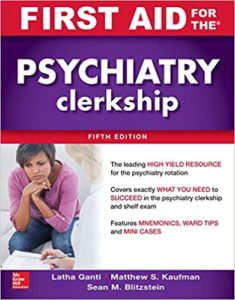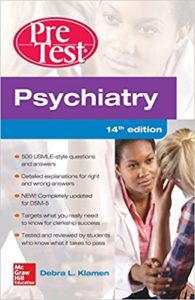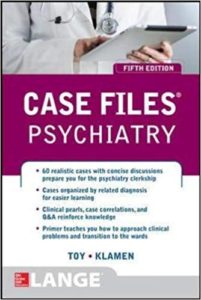
Psychiatry is generally one of the lighter rotations with a gentler shelf examination. It is also very interesting seeing a wide range of psychiatric conditions both stable and unstable, their management, and how patients improve.
Typical Schedule
This is institution dependent. We have options to be placed on an inpatient psychiatric floor, do psych consults, or go to a residential psychiatric center in Vermont for more opportunities including child psych. Our day started a little later around 7:30/8am. We would have a morning meeting and round on our patients in the morning. Afternoons were for teaching, studying, or going to clinic.
Your Expectations
Again, ask your residents and attending your expectations day 1. On inpatient psych, we pre-rounded on our patients before rounds and presented during rounds. We would write notes, write admission H&Ps, call family members, and do safety plans with the patients before discharge. If there is an opportunity to see electro-convulsive therapy (ECT) or go to court to mandate drug therapy in a non-adherent patient, you should attend.
You may see some alarming behavior in crisis centers, inpatient wards, and outpatient clinic. Do your best to remain nonjudgmental, and practice your poker face. Safety is important, especially inpatient and in crisis centers. Never be alone with a patient, always be at an arm’s distance, and if you feel nervous, get yourself out of the situation.
In the outpatient world, you may not do your own intakes or see patients on your own. It depends entirely on the practice, but many of these patients are fragile and have developed relationships with their providers. I was on child psych and mostly shadowed.
How to Study for the Psychiatry Clerkship
Thankfully, psych is not too grueling. It’s important to learn the various disorders (the clusters, schizophrenia vs schizophreniform vs schizoaffective disorder), what distinguishes them, and the various psych medications. There is also some neurology on the shelf. I would recommend reading the first chapter of First Aid for Psychiatry to learn the definitions towards the beginning of your clerkship. Then, I would do all of OnlineMedEd and tackle the UWorld psychiatry and neurology questions. There are not very many psych questions on UWorld, so Pre-Test for Psychiatry or Lange are helpful for extra practice.
A big portion of the shelf exam is psych medications. Review the mechanisms, side effects, and contraindications for the meds. Sketchy Medical is a great resource if you have it. If not, First Aid is a great resource.
For the OSCE, be sure you know how to do a psychiatric interview. Learn a bit of the language of psych (chapter 1 of First Aid) and you will be golden.
I had psych last in the year and used the lighter month as a time to finish up the UWorld questions I hadn’t gotten to earlier in the year to prepare for CK. Definitely learn psych (or whatever you have your last rotation) so you do not have to review it during your dedicated study period.
Psychiatry Resources

First Aid for Psychiatry – Bare minimum, read chapter 1. This book is gold for psych.

Pre-Test for Psychiatry – Very helpful for extra questions (especially if you’re like me and mix up the disorders).

Case Files Psychiatry – This is great for you Case Files lovers and for preparing for the OSCE.
How did you study for your psychiatry clerkship?
Disclaimer: There are affiliate links in this post to support this site and keep it ad free. There are no additional costs to you.

Leave a Reply